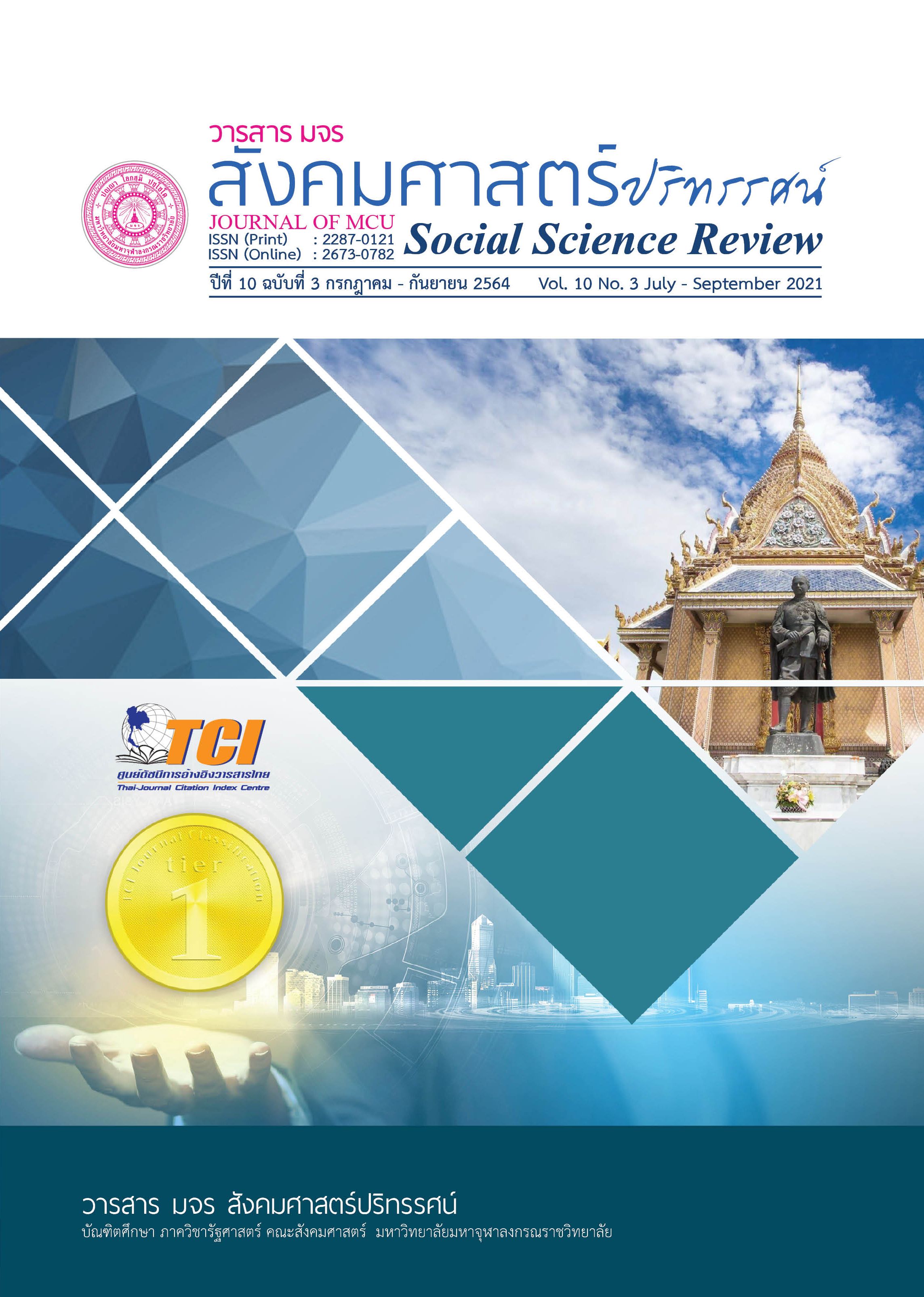ETHICAL LEADERSHIP OF SECONDARY EDUCATION SCHOOL ADMINISTRATOR UNDER LOP BURI PROVINCIAL EDUCATION
Keywords:
Ethical leadership, School administrator, Lop Buri Provincial EducationAbstract
The purposes of this research were: 1) Study level of ethical leadership of secondary education school administrator under Lop Buri Provincial Education. And 2) Comparing ethical leadership of secondary education school administrator under Lop Buri Provincial Education classified by sex, age, education level and work experience. It was quantitative research. The sample groups were 302 teachers in secondary education school administrator under Lop Buri Provincial Education. Obtained by Stratified sampling. The Tools used to collect information were questionnaires with 5 levels of estimation scale. Statistical data were analyzed by using a computer program. The analyzed by using frequency, percentage, mean, standard deviation, t-test and f-test.
The research results revealed that: 1) Level of ethical leadership of secondary education school administrator under Lop Buri Provincial Education, overall and each aspect very level, found that sorted from the side with the highest average to the lowest: trust, fairness, Honestly and responsibility. 2) Comparison results of ethical leadership of secondary education school administrator under Lop Buri Provincial Education classified by sex, age, education level and work experience found that: sex, age, education level and work experience were different, ethical leadership of secondary education school administrator under Lop Buri Provincial Education were differed not statistically.
References
คณาพงษ์ พึ่งมี. (2562). ภาวะผู้นำเชิงพุทธของผู้บริหารสถาบันวิจัยวิทยาศาสตร์และเทคโนโลยีแห่งประเทศไทย. วารสารพุทธนวัตกรรมและการจัดการ, 2(2), 50-58.
ชุติมา รักษ์บางแหลม. (2559). ภาวะผู้นำเชิงจริยธรรม: หนทางสู่การขับเคลื่อนภาวะผู้นำในสถาบันการศึกษา. วารสารมหาวิทยาลัยนราธิวาสราชนครินทร์, 8(1), 168 – 181.
ดวงฤดี ศิริพันธุ์. (2561). ภาวะผู้นำเชิงจริยธรรมของผู้บริหารสถานศึกษาตามความคิดเห็นของครูโรงเรียนการกุศล ของวัดในพระพุทธศาสนา สังกัดสำนักงานการศึกษาเอกชน จังหวัดสงขลา. สงขลา: การประชุมหาดใหญ่วิชาการระดับชาติและนานาชาติ ครั้งที่ 9, ในวันที่ 20 – 21 กรกฎาคม พ.ศ. 2561 ณ มหาวิทยาลัยหาดใหญ่.
เนาวรัตน์ รอดเพียน. (2560). ภาวะผู้นำเชิงจริยธรรมที่ส่งผลต่อประสิทธิภาพการบริหารงานบุคลากรของโรงเรียนอาชีวศึกษาเอกชน เขตพื้นที่กรุงเทพมหานคร (วิทยานิพนธ์ครุศาสตรมหาบัณฑิต สาขาวิชาการบริหารการศึกษา). ฉะเชิงเทรา: มหาวิทยาลัยราชภัฏราชนครินทร์.
บรรจพร แย้มละมูล และคณะ. (2563) ปัจจัยเชิงสาเหตุที่ส่งผลต่อการบริหารเชิงจริยธรรมของผู้บริหารสถานศึกษามัธยมศึกษาภาค ตะวันออกสังกัดสำนักงานคณะกรรมการการศึกษาขั้นพื้นฐาน. วารสารครุศาสตร์ปริทรรศน์ฯ, 7(3), 130 – 143.
วิโรจน์ สารรัตนะ. (2553). การวิจัยทางการบริหารทางการศึกษาแนวคิดและกรณีศึกษา. ขอนแก่น: มหาวิทยาลัยขอนแก่น.
ศศิธร อนันตพันธุ์พงศ์. (2561). พุทธภาวะผู้นำเชิงทศบารมีเพื่อการบริหารการเปลี่ยนแปลงองค์กร. วารสารสหวิทยาการนวัตกรรมปริทรรศน์, 1(1), 44-50.
สุจิต กิ่งเกล้าและคณะ. (2562). การบูรณาการหลักปาปณิกธรรมเพื่อส่งเสริมคุณลักษณะผู้นำที่พึงประสงค์ของผู้บริหารสำนักงานประกันสังคมจังหวัดสมุทรสาคร. วารสารสหวิทยาการนวัตกรรมปริทรรศน์, 2(2), 34-43.
สุทัด จันทะสินธุ์. (2560). รูปแบบภาวะผู้นำเชิงจริยธรรมแบบบูรณาการของผู้บริหารสถานศึกษาสังกัดสำนักงานคณะกรรมการการศึกษาขั้นพื้นฐาน (วิทยานิพนธ์ปรัชญาดุษฎีบัณฑิต สาขาวิชาการบริหารการศึกษา). เชียงใหม่: มหาวิทยาลัยเชียงใหม่.
สุธาสินี แม้นญาติ. (2554). โมเดลความสัมพันธ์โครงสร้างปัจจัยที่ส่งผลต่อภาวะผู้นำเชิงจริยธรรม ของผู้บริหารสถานศึกษา สังกัดกรมส่งเสริมการปกครองท้องถิ่น (วิทยานิพนธ์ปริญญาปรัชญาดุษฎีบัณฑิต สาขาวิชาการบริหารการศึกษา). ขอนแก่น:มหาวิทยาลัยขอนแก่น.
สุรัตน์ ไชยชมภู. (2557). ภาวะผู้นำเชิงจริยธรรมในการบริหารสถานศึกษา. วารสารการบริหารการศึกษา มหาวิทยาลัยบูรพา, 8(2), 1 – 15.
สุวรรณ์ แก้วนะ. (2562). การพัฒนาคุณลักษณะผู้นำของผู้บริหารเทศบาลตามหลักพุทธธรรม. วารสารสหวิทยาการนวัตกรรมปริทรรศน์, 2(1), 39-45.
หนูไกร มาเชค. (2559). การพัฒนาภาวะผู้นำเชิงจริยธรรมในผู้บริหารสถานศึกษา สังกัดสำนักงานคณะกรรมการการศึกษาขั้นพื้นฐาน. (ดุษฎีนิพนธ์ปรัชญาดุษฎีบัณฑิต สาขาวิชาการบริหารการศึกษา). ชลบุรี: มหาวิทยาลัยบูรพา.
Berghofer, D., & Schwartz, G. (2008). Ethical leadership: Right relationships and the emotional bottom line the gold standard for success. Retrieved February 3, 2020 from http://www.newparadigmjournal.com/Oct2008/ethicalleadership.htm
Brown, M. E., & Treviño, L. K. (2006). Ethical Leadership: A Review and Future Directions. The Leadership Quarterly, 17, 595-616.
Ferrell, O. C., et al. (2008). Business ethical: Ethical decision making and case (7th ed.). Boston, MA: Houghton Mifflin.
Glanz, J. (2006). What every principal should know about ethical and spiritual leadership. Thousand Oaks, CA: Corwin.
Josephson, M. (2009). Ethical leadership outcomes student leader learning outcomes (SLLO) project. Retrieved February 3, 2020 from http://sllo.tamu.edu/rubrics
Kocabas, I., & Karakose, T. (2009). Ethics in school administration. African Journal of Business Management, 3(4), 126-130.
Krejcie, R.V. & Morgan, D.W. (1970). Educational and Psychological Measurement. New York: Minnisota University.
National Centre for Ethics in Health Care. (2005). Ethical leadership toolkit a manual for the ethical leadership coordinator. Retrieved February 3, 2020 from http://www.ethics.va.gov/integratedethics/ELC.asp
Neubert, M. J., et al. (2009). The virtuous influence of ethical leadership behavior: Evidence from the field. Journal of Business Ethics, 90, 157-170.
Northouse, Peter G. (2003). Leadership Theory and Practice (3rd ed.). Western Michigan University: SAGE Publications.
Downloads
Published
How to Cite
Issue
Section
License
Copyright (c) 2021 Journal of MCU Social Science Review

This work is licensed under a Creative Commons Attribution-NonCommercial-NoDerivatives 4.0 International License.
In order to conform the copyright law, all article authors must sign the consignment agreement to transfer the copyright to the Journal including the finally revised original articles. Besides, the article authors must declare that the articles will be printed in only the Journal of MCU Journal of Social Sciences. If there are pictures, tables or contents that were printed before, the article authors must receive permission from the authors in writing and show the evidence to the editor before the article is printed. If it does not conform to the set criteria, the editor will remove the article from the Journal without any exceptions.





